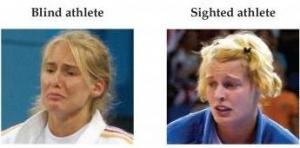The expression of emotion is innate
The expression of emotions depends on our genes, according to a new study. This study identifies that the expression of emotions is innate, not a product of learning. This is the first study to demonstrate that bright-eyed people and blind people have the same facial expressions and have the same facial movement when responding to emotional stimuli.
The study also provides new insights into how people control emotional expression according to social circumstances, suggesting that the ability to control emotional expression is never learned through observation.
Professor David Matsumoto of San Francisco State University's University of Medicine compared the facial expressions of bright and blind judo athletes at the Summer Olympics and the 2004 Olympic Games. More than 4,800 photos were taken. and analysis, including photos of athletes from 23 countries.
 The image shows a comparison of the expression of a blind and bright athlete's face when losing a medal match. (Photo: Bob Willingham)
The image shows a comparison of the expression of a blind and bright athlete's face when losing a medal match. (Photo: Bob Willingham)
Matsumoto said: 'The correlation between the face of the bright-eyed and the blind is almost perfect.This shows that something genetically within us is the source of facial expression. '
Matsumoto discovered that bright eyes and blind people control the expression of emotions in the same way according to social circumstances. For example, because of the nature of the Olympic medal ceremony, 85% of silver medal winners who lost their medals still tried to laugh at the prize. This wry smile used only the mouth muscles while the real smile, called the Duchenne smile, made the eyes soaked and narrowed and the mound was raised.
Matsumoto explains: 'The losers push their lower lip to control their emotions on their faces, and a lot of people laugh wryly. People who are blind from birth cannot learn to control this emotion, so there must be another mechanism.It is possible that our emotions, and the system that controls them, are inherited from our ancestors. Chances are that dealing with negative emotions, people have developed a system that allows them to shut their mouths to prevent them from yelling, biting or making offensive words. '
- Yes or no innate genius?
- There is technology to accurately identify whether you are happy or sad
- The wearer will know how to detect the sad emotion
- Correct understanding of Histology
- The world famous 'Emotion of animals'
- Leadership is the innate quality or because of my practice?
- The sign of identification will become a genius
- Guess the emotion by typing the keyboard
- Children without emotion are more likely to fail
- Monkey expresses emotions like humans
- Latest discovery of the fastest runners on the planet
- Wi-fi waves can indicate your emotions
 'Fine laughs' - Scary and painful torture in ancient times
'Fine laughs' - Scary and painful torture in ancient times The sequence of numbers 142857 of the Egyptian pyramids is known as the strangest number in the world - Why?
The sequence of numbers 142857 of the Egyptian pyramids is known as the strangest number in the world - Why? History of the iron
History of the iron What is alum?
What is alum?